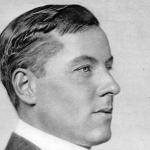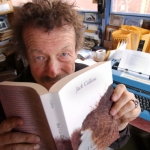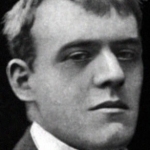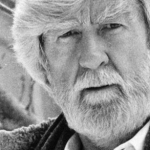I took a contract to bury the body of blasphemous Bill MacKie,
Whenever, wherever or whatsoever the manner of death he die —
Whether he die in the light o’ day or under the peak-faced moon;
In cabin or dance-hall, camp or dive, mucklucks or patent shoon;
On velvet tundra or virgin peak, by glacier, drift or draw;
In muskeg hollow or canyon gloom, by avalanche, fang or claw;
By battle, murder or sudden wealth, by pestilence, hooch or lead —
I swore on the Book I would follow and look till I found my tombless dead.
For Bill was a dainty kind of cuss, and his mind was mighty sot
On a dinky patch with flowers and grass in a civilized boneyard lot.
And where he died or how he died, it didn’t matter a damn
So long as he had a grave with frills and a tombstone “epigram.”
So I promised him, and he paid the price in good cheechako coin
(Which the same I blowed in that very night down in the Tenderloin).
Then I painted a three-foot slab of pine: “Here lies poor Bill MacKie,”
And I hung it up on my cabin wall and I waited for Bill to die.
Years passed away, and at last one day came a squaw with a story strange,
Of a long-deserted line of traps ’way back of the Bighorn range,
Of a little hut by the great divide, and a white man stiff and still,
Lying there by his lonesome self, and I figured it must be Bill.
So I thought of the contract I’d made with him, and I took down from the shelf
The swell black box with the silver plate he’d picked out for hisself;
And I packed it full of grub and “hooch,” and I slung it on the sleigh;
Then I harnessed up my team of dogs and was off at dawn of day.
You know what it’s like in the Yukon wild when it’s sixty-nine below;
When the ice-worms wriggle their purple heads through the crust of the pale blue snow;
When the pine-trees crack like little guns in the silence of the wood,
And the icicles hang down like tusks under the parka hood;
When the stove-pipe smoke breaks sudden off, and the sky is weirdly lit,
And the careless feel of a bit of steel burns like a red-hot spit;
When the mercury is a frozen ball, and the frost-fiend stalks to kill —
Well, it was just like that that day when I set out to look for Bill.
Oh, the awful hush that seemed to crush me down on every hand,
As I blundered blind with a trail to find through that blank and bitter land;
Half dazed, half crazed in the winter wild, with its grim heartbreaking woes,
And the ruthless strife for a grip on life that only the sourdough knows!
North by the compass, North I pressed; river and peak and plain
Passed like a dream I slept to lose and I waked to dream again.
River and plain and mighty peak — and who could stand unawed?
As their summits blazed, he could stand undazed at the foot of the throne of god.
North, aye, North, through a land accurst, shunned by the scouring brutes,
And all I heard was my own harsh word and the whine of the malamutes,
Till at last I came to a cabin squat, built in the side of a hill,
And I burst in the door, and there on the floor, frozen to death, lay Bill.
Ice, white ice, like a winding-sheet, sheathing each smoke-grimed wall;
Ice on the stove-pipe, ice on the bed, ice gleaming over all;
Sparkling ice on the dead man’s chest, glittering ice in his hair,
Ice on his fingers, ice in his heart, ice in his glassy stare;
Hard as a log and trussed like a frog, with his arms and legs outspread.
I gazed at the coffin I’d brought for him, and I gazed at the gruesome dead,
And at last I spoke: “Bill liked his joke; but still, goldarn his eyes,
A man had ought to consider his mates in the way he goes and dies.”
Have you ever stood in an Arctic hut in the shadow of the Pole,
With a little coffin six by three and a grief you can’t control?
Have you ever sat by a frozen corpse that looks at you with a grin,
And that seems to say: “You may try all day, but you’ll never jam me in”?
I’m not a man of the quitting kind, but I never felt so blue
As I sat there gazing at that stiff and studying what I’d do.
Then I rose and I kicked off the husky dogs that were nosing round about,
And I lit a roaring fire in the stove, and I started to thaw Bill out.
Well, I thawed and thawed for thirteen days, but it didn’t seem no good;
His arms and legs stuck out like pegs, as if they was made of wood.
Till at last I said: “It ain’t no use — he’s froze too hard to thaw;
He’s obstinate, and he won’t lie straight, so I guess I got to — saw.”
So I sawed off poor Bill’s arms and legs, and I laid him snug and straight
In the little coffin he picked hisself, with the dinky silver plate,
And I came nigh near to shedding a tear as I nailed him safely down;
Then I stowed him away in my Yukon sleigh, and I started back to town.
So I buried him as the contract was in a narrow grave and deep,
And there he’s waiting the Great Clean-up, when the Judgment sluice-heads sweep;
And I smoke my pipe and I meditate in the light of the Midnight sun,
And sometimes I wonder if they was, the awful things I done.
And as I sit and the parson talks, expounding of the Law,
I often think of poor old Bill — and how hard he was to saw.



















Comment form: